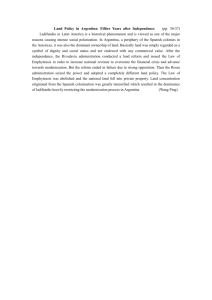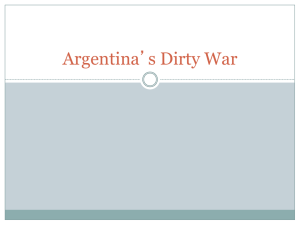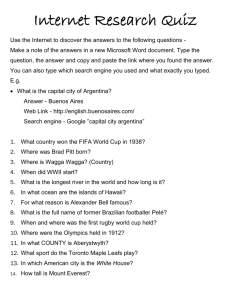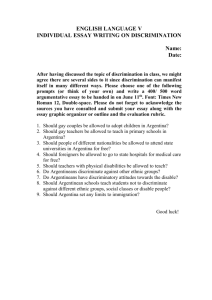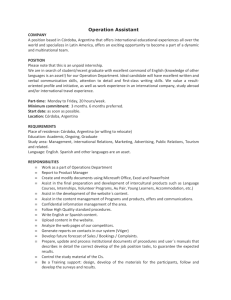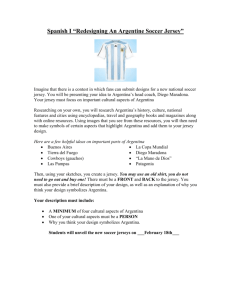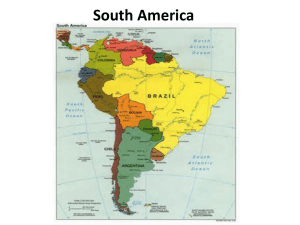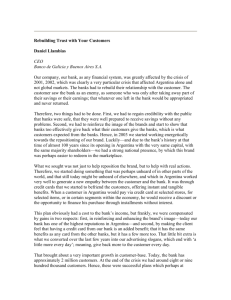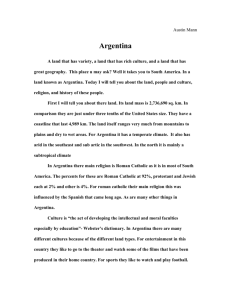Comparative Literature 130 - WordPress @ Clark U
advertisement
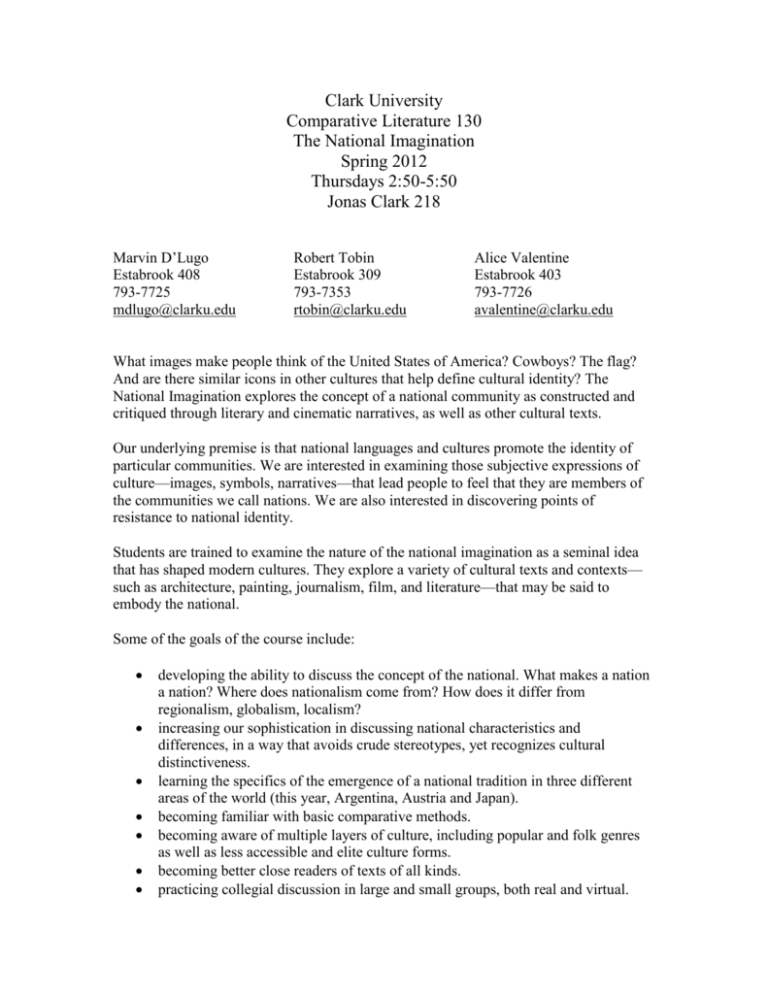
Clark University Comparative Literature 130 The National Imagination Spring 2012 Thursdays 2:50-5:50 Jonas Clark 218 Marvin D’Lugo Estabrook 408 793-7725 mdlugo@clarku.edu Robert Tobin Estabrook 309 793-7353 rtobin@clarku.edu Alice Valentine Estabrook 403 793-7726 avalentine@clarku.edu What images make people think of the United States of America? Cowboys? The flag? And are there similar icons in other cultures that help define cultural identity? The National Imagination explores the concept of a national community as constructed and critiqued through literary and cinematic narratives, as well as other cultural texts. Our underlying premise is that national languages and cultures promote the identity of particular communities. We are interested in examining those subjective expressions of culture—images, symbols, narratives—that lead people to feel that they are members of the communities we call nations. We are also interested in discovering points of resistance to national identity. Students are trained to examine the nature of the national imagination as a seminal idea that has shaped modern cultures. They explore a variety of cultural texts and contexts— such as architecture, painting, journalism, film, and literature—that may be said to embody the national. Some of the goals of the course include: developing the ability to discuss the concept of the national. What makes a nation a nation? Where does nationalism come from? How does it differ from regionalism, globalism, localism? increasing our sophistication in discussing national characteristics and differences, in a way that avoids crude stereotypes, yet recognizes cultural distinctiveness. learning the specifics of the emergence of a national tradition in three different areas of the world (this year, Argentina, Austria and Japan). becoming familiar with basic comparative methods. becoming aware of multiple layers of culture, including popular and folk genres as well as less accessible and elite culture forms. becoming better close readers of texts of all kinds. practicing collegial discussion in large and small groups, both real and virtual. COURSE REQUIREMENTS 1. Regular attendance at all class sessions. More than one unexcused absence will adversely affect your grade. When you know you will be absent, please have the courtesy of contacting one of us in advance by e-mail. 2. Preparation of all assigned readings and viewing of all assigned films prior to class. 3. Participation—in class and on line. Although this is a large class, we expect participation in both the small sections and, when possible, the larger group meetings. Electronic Participation will consist primarily of weekly Cicada forum postings. Generally, each student should post at least one comment by midnight of the Wednesday preceding each class. Pop quizzes and occasional small homework assignments count toward the participation grade. 4. After each of the three “National Experiences” students will complete a take-home examination. Instead of a take-home exam, students may, however, undertake one of the following alternative assignments: a research paper (circa 8 pages) based on class readings, with a bibliography of at least five scholarly essays on the subject. Students must clear the topic with the appropriate faculty member at least a week before the due date. a visual/aural culture project, involving the visual and aural dimensions of themes and materials presented in course readings. These may be collaborative projects. Students must clear topics with the faculty at least a week before the due date for the take-home of each unit. Students who write research papers or develop visual/aural culture projects are encouraged to present them at Academic Spree day (April 25). Due Dates for submitting take-home essays and analytic essays: Argentine Experience: February 20 Japanese Experience: March 26 Austrian Experience: April 23 GRADING Final grades will be based on the following percentages: Argentine Experience 25% Austrian Experience 25% Japanese Experience 25% Participation 25% The participation grade includes small classroom assignments, pop quizzes, and the activities planned for the last day of classes! The faculty will collaborate on the grading—no single professor will be responsible for a single grade. Plagiarism: Plagiarized papers will result in a grade of 0 for the unit in question, and may result in a grade of F for the class as a whole. We will report plagiarism to the Dean of Academic Advising. A second report of plagiarism may result in expulsion from the university. REQUIRED TEXTS Austria Franz Kafka, The Metamorphosis. Translated and edited by Stanley Corngold. Norton: 1996. Sigmund Freud, Civilization and its Discontents, trans. James Strachey, ed. Peter Gay (New York: Norton, 1969) Franz Kafka. Selected Short Stories. Translated and edited by Stanley Corngold. Norton: 2006. Recommended: Burton Fisher, Mozart’s Magic Flute: Opera Classics Library Series. Opera Journeys Publishing: 2005 Elfriede Jelinek, The Piano Teacher: A Novel. Trans. Joachim Neugroschel. Reprint, Grove Press: 2009. Argentina The Argentina Reader: History, Culture, Politics. Ed. Nouzeilles and Montaldo. Selected texts available on Cicada. Japan Junichiro Tanizaki. Some Prefer Nettles. Trans. Edward G. Seidensticker. New York: Vintage, 1995. Natsume Soseki. Kokoro. Trans. Meredith McKinney. New York: Penguin Classics, 2010. The following short stories will be available on Cicada: Kurahashi Yumiko, “An Extraterrestrial” 1964 Nosaka Akiyuki, “American Hijiki,” 1967 Kono Taeko, “Bone Meat,” 1969 Haruki Murakami, “UFO in Kushiro,” 2001 FILMS AVAILABLE AT GODDARD LIBRARY RESERVE DESK: Please make every effort to watch the film versions recommended. If you watch these films from web sources, please be aware that they are often edited or cut and rarely have the visual or sound quality of the versions on reserve. Argentina Camila (1984). Directed by María Luisa Bemberg. El último verano de la boyita/ The Last Summer of La Boyita (2009). Directed by Julia Solomonoff. The Lost Republic (1983). Directed by Miguel Pérez. Austria The Magic Flute, by Wolfgang Amadeus Mozart. Watch the BBC edition, unless you already know the opera and want a new treat—in which case watch the Bergman version on Criterion. Both are available on reserve in Goddard. The Piano Teacher (2001). Directed by Michael Haneke. Japan Tokyo Sonata (2008), directed by Kiyoshi Kurosawa. COURSE INTRODUCTION January 19: What is a National Imagination? Singing the Nation. National Anthems of Argentina, Austria and Japan. How does the course work? What would you list as your identity? What would you list as your national identity? What are your stereotypes about Argentines, Austrians and Japanese? INVENTING ARGENTINA January 26: Inventing Argentina Readings Due: Leopoldo Lugones. “National Identity in a Cosmopolitan Society” [Argentina Reader: 209-13] Domingo F. Sarmiento. “Civilization and Barbarism” [Argentina Reader: 80-90] Esteban Echeverría. “The Slaughterhouse” [Argentina Reader: 107-114] José Herández, “Gauchos in and Out of the State” [Argentina Reader: 133-45] Film: María Luisa Bemberg: Camila February 2: The 1930s Readings Due: 1. Jorge Luis Borges. “Man from the Slums” / El hombre de la esquina rosada 2. “The South”/ El sur 3. “Emma Zunza” 4. Simon Collier. “The Birth of the Tango” [Argentina Reader: 196-202] 5. Enrique Santos Discépolo “Cambalanche” [Argentina Reader 266-7] Film: The Lost Republic (first hour approximately) February 9: Inventing the Argentine Man Readings Due: 1. Roberto Arlt. “Soccer and Popular Joy [Argentina Reader: 263-5, 2. Eduardo Archetti. “Multiple Masculinities: The Worlds of Tango and Football in Argentina” [to be distributed on Cicada] 3. Julio Cortázar: “House Taken Over” [Argentina Reader: 328-32] 4. Julio Cortázar” “Meeting” [to be distributed on Cicada] 5. Ché’s Afterlife [selections to be distributed] February 16: Inventing the Argentine Woman 1. 2. 3. Tomás Eloy Martínez. “Saint Evita” [Argentina Reader: 296-303 Luisa Valenzuela: [selections to be distributed] “Addendum” “The Best Shod” “Symmetries” “Our Cristina” [selections to be distributed] Film: Julia Solomonoff. El ultimo verano de la boyita/ Last Summer in the Boyita. February 20: Take-Home Exams or Analytic Essays on Argentina due. INVENTING JAPAN February 23: A New Family Narrative: Imagining Self and Nation in an Era of Transformation Read Soseki’s novel, Kokoro, and explore the “Black Ship Scrolls” [see Cicada link]. The modern nation of Japan was invented in the Meiji period (1868-1912), a time of dizzyingly rapid and wholesale adoption of the West’s values and institutions. We can read Soseki’s search for the meaning of the self in this 1914 novel as a metaphor for Japan’s search for a new national and international identity. What, then, do the narrator’s and sensei’s families tell us about this new nation? How can we understand Sensei’s sense of loss and alienation in terms of the heroic Meiji quest for “Civilization and Enlightenment”? March 1: Competing Family Narratives: Defining Japan against the Other as Modernity Challenges Memory Read Tanizaki’s novel, Some Prefer Nettles. By the time Tanizaki wrote Some Prefer Nettles in 1928, Japan had experienced 50 years of modern nationhood. The uneasy balance between adopting (western) “civilization and enlightenment” while maintaining “Japanese Spirit,” and the need to locate the modern Japanese nation state in a uniquely Japanese past, is the backstory of the novel. What happens as feudal assumptions about social relationships and gender roles are called into question by increasing, and increasingly sophisticated, contact with the west? What are the competing family narratives, and what might they tell us about the nation? In this novel about traditional theater, how is national identity performed? SPRING BREAK March 15: Contested Family Narratives: Re-Imagining Race, Gender, and Identity in Post-War Japan Read the three stories posted on Cicada: Nosaka Akiyuki’s “American Hijiki,” Kurahashi Yumiko’s “An Extraterrestrial,” and Kono Taeko’s “Bone Meat.” Written in the years following Japan’s catastrophic defeat in WWII, these 3 stories reveal fissures in the pre-war understanding of self and role. National shame, a new constitution, and a dramatic economic recovery are the backdrop for a re-examination of the nature of power, race, and conventional gender norms. How do these stories unsettle our understanding of the Japanese family? How do they contribute to our understanding of the nation? March 22: Ambiguous Family Narratives: What does it mean to be Japanese in the postPost-War? Watch Kurosawa Kiyoshi’s Tokyo Sonata. There will be a communal screening on March 20 . Otherwise, it is available on reserve in Goddard. Read Haruki Murakami’s very short story “UFO in Kushiro” [Cicada link], and explore the Takashi Murakami links on Cicada. How does Kurosawa use the microcosm of the family to reveal a changing Japan? How is the issue of Western influence revisited in the film, the Murakami story, and in Takashi Murakami’s art? How is cultural identity connected to commerce? To national trauma? March 26: Take-Home Exams or Analytic Essays on Japan due AUSTRIA UNDER ERASURE March 29: A Habsburg Empire: Mozart’s Magic Flute In Mozart’s era, Austria was just one of many provinces under the rule of the Habsburgs. National identity is much less important than the monarch one serves. How is this understanding of the nation reflected in Mozart’s Magic Flute? What models of nationhood do we see in this opera, and how are they gendered? Read the libretto of The Magic Flute, either on line (see link on Cicada) or in the recommended edition. Watch the BBC edition of Mozart’s Magic Flute. There will be a communal screening prior to class, probably on March 27. Otherwise, it is available at the reserve desk of Goddard. April 5: Kafka in Austria-Hungary: Minorities and Modernism in The Dual Monarchy Franz Kafka grew up as a citizen of Austria-Hungary. A German-speaking Jew in Prague in what was then Moravia (now the Czech Republic), he lived the life of a minority within the rapidly modernizing multi-national Habsburg Empire, known as Austria-Hungary from 1867 to 1918. “The Metamorphosis” was published in 1915, as the so-called Dual Monarchy was already embroiled in the World War that would be its end. “In the Penal Colony” was begun in 1914 and published in 1919, after the Empire had ceased to exist. Do Kafka’s short stories reflect his position as a minority in a modernizing Empire? Do they reflect the peculiar supranational nature of the Empire? And what does “In the Penal Colony” have to do with colonialism? Reading: Kafka’s “Metamorphosis” from the Norton Edition of that name, and “In the Penal Colony,” from the Norton Edition of Kafka’s Selected Short Stories, both edited by Visiting Lecture by the translator, Professor Stanley Corngold (Princeton University): “Franz Kafka and the Poetry of Risk Insurance.” Dana Commons 5 pm. April 12: Freud and the Folk-Nation: Austria as Part of Greater Germany. In 1938, Hitler’s Germany annexed Austria, which became known as the Anschluss. Contrary to what you might think from The Sound of Music, the Anschluss was wildly popular in Austria. After all, what could be better than a people with a shared language and culture coming together politically? Reading: Freud, Civilization and its Discontents April 19: The Modern Nation-State in the European Context: The Piano Teacher. In the wake of the Second World War, Austria has emerged as an arguably model small nation-state, originally neutral and now an active member in the European Union. The Austrian filmmaker Michael Haneke has directed a film based on his compatriot Elfriede Jelinek’s novel, The Piano Teacher. How does the film expose the complexities of Austrian identity? How does it relate to early works of Austrian literature? What additional layers of commentary about identity emerge because the actors of the film are French and speak French? Assignment: Watch Michael Haneke’s The Piano Teacher. There will be a communal screening, probably on April 17. If you can’t make that, it is available on reserve at Goddard. Note: the film contains some graphic depictions of self-mutilation and violent sex. If you would prefer not to see these, you may read the book instead. April 23: Take-Home Exams or Analytic Essays on Austria due CONCLUSION April 26: Questioning the Nation
